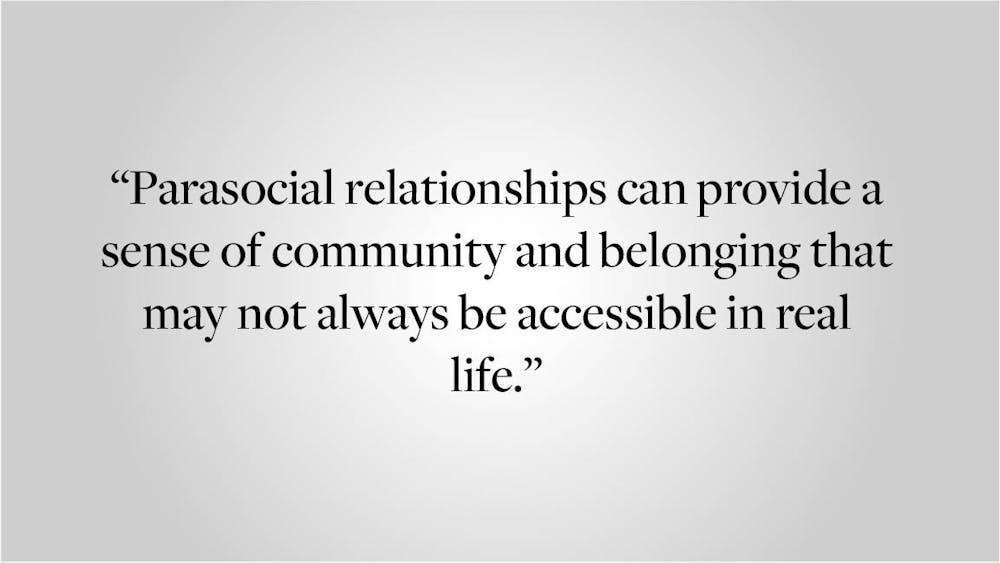Breaking the fourth wall on television by directly addressing the audience creates a sense of intimacy. Parasocial relationships, or when viewers of media feel a close connection to those represented in the media, have been an important part of social experiences since the advent of television, and as mass media continues to grow, the prevalence of parasocial relationships has also grown. The explosion of internet media in the early 2000s introduced new ways to parasocially bond with public figures, such as by listening to podcasts or scrolling through social media. The concept of parasocial relationships has emerged as an important piece of the internet social experience, and the concept itself has received new scrutiny in recent years. However, dismissing the validity of parasocial relationships misses the possibility that embracing parasocial relationships could enrich one’s social life overall.
The negative perception of parasocial relationships is not groundless. The accessibility of public figures on social media can lead to a sense of entitlement on the part of audiences, which can make public figures uncomfortable and even put them in danger. Fans may also place their favorite celebrities on pedestals and lash out if the celebrities can’t live up to their unfair expectations. For example, fans were disappointed by a popular Minecraft YouTuber’s appearance when he recently did a face reveal, despite the fact that they’d subscribed for his content.
Although parasocial relationships can become unhealthy, it’s important to acknowledge that mutual relationships can also become unhealthy. These two forms of interpersonal relationships fulfill different social needs. Dependence on parasocial relationships is positively correlated with loneliness but negatively correlated with interpersonal distrust. On the other hand, dependence on mutual relationships is negatively correlated with loneliness but positively correlated with interpersonal distrust. It is possible that embracing both kinds of relationships could create a healthy balance of each of these feelings.
Parasocial relationships provide a safe environment for people to work on themselves and open up to others, which can be especially helpful for people who struggle forming close bonds in real life. One study found that undergraduate students with low self-esteem form parasocial relationships with celebrities that embody their ideal self. Furthermore, when low self-esteem individuals reflect on their favorite celebrity’s characteristics, they are better able to close the discrepancy between their current self and their ideal.
While mutual friendships with people that embody one’s ideal self can facilitate the same effect, the potency of this effect is only as salient as the emotional intimacy between the two parties in the relationship. Thus, because low self-esteem individuals are less willing to let people get close for fear of rejection, parasocial relationships can be an important avenue for personal development.
In addition, neurodivergent individuals particularly benefit from parasocial relationships. Parasocial relationships with fictional characters provide a space for people on the autism spectrum to practice social skills and cope with challenges.
Furthermore, parasocial relationships can provide a sense of community and belonging that may not always be accessible in real life. The internet provides access to a diverse range of role models. Video essayists, gaming streamers, Disney theme park enthusiasts — people can now easily find creators who align with their interests and ideals. This can be especially important for individuals whose circumstances leave them feeling socially isolated. For example, LGBTQ+ youth are more likely than their straight peers to use the internet to address feelings of isolation. One way in which they do this is through fandom culture, where youth create artwork and fanfiction about characters they resonate with to explore their own identities.
Loneliness and the intensity of parasocial relations are not correlated, which indicates that parasocial relationships may act as a means to widen one’s interpersonal social sphere rather than as a substitute for mutual social relationships. The solution to unhealthy parasocial relationships on the internet is not to discourage parasocial relationships. Doing so fails to account for the full benefits of healthy parasocial relationships which can foster rich interpersonal relationships for all media-consumers.





